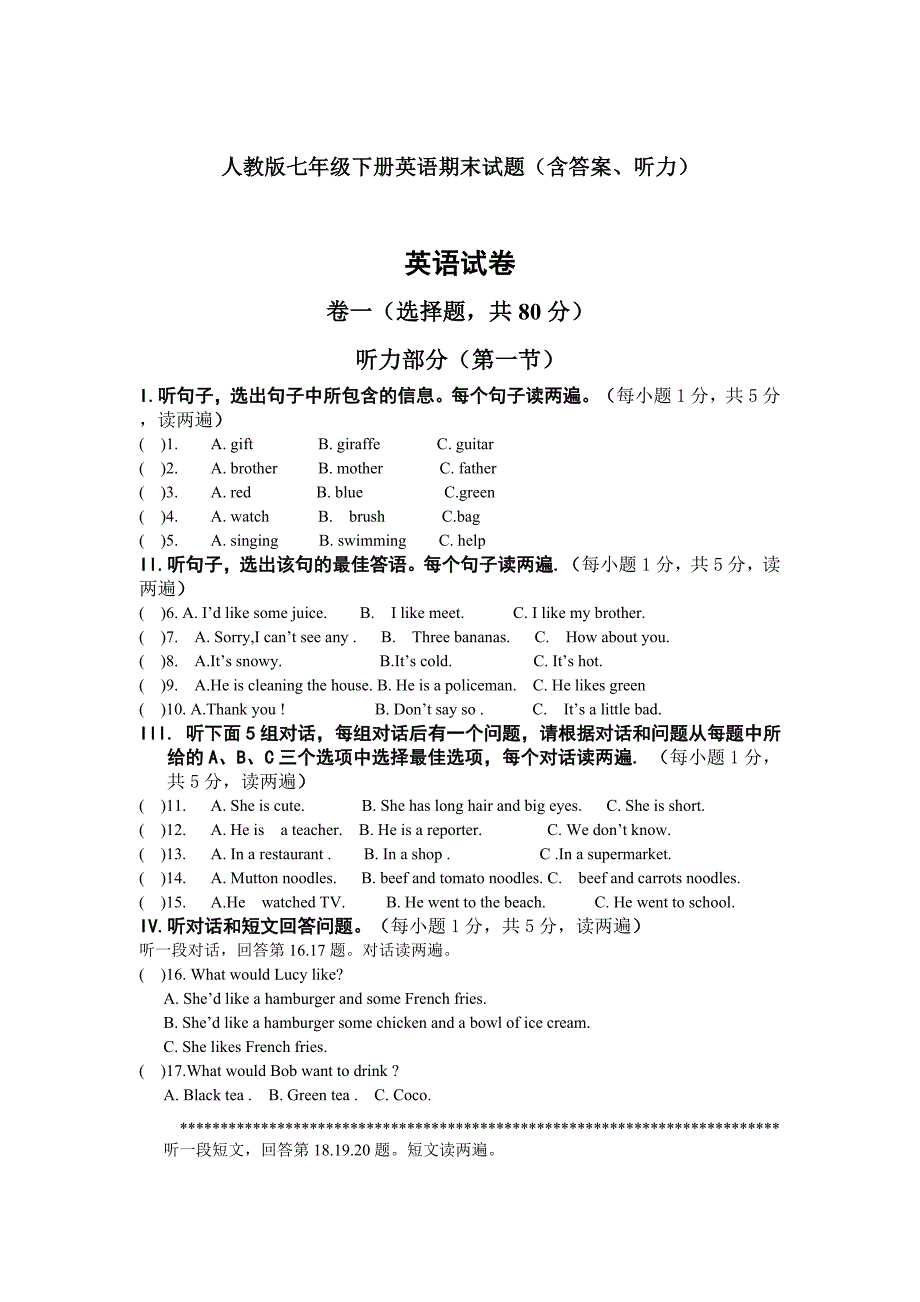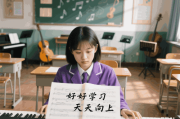
2015年6月13日全国大学英语六级考试已结束,本次考试为多题多卷,青年人网第一时间收集整理不同版本试题,供考生参考,以下是2015年6月大学英语六级考试听力材料原文:
点击收听>>>2015年6月大学英语六级考试听力录音材料(音频)
Section A
短对话
1
W: Can you come to the concert with me this weekend? Or do youhave to prepare for exams?
M: I still have a lot to do, but maybe a break would do megood。
Q: What will the man probably do?
2
W: What does the paper say about the horrible incident thathappened this morning on flight 870 to Hongkong?

M: It ended with the arrest of the 3 hijackers. They have forcedthe plane to fly to Japan, but all the passengers and crew memberslanded safely。
Q: What do we learn from the conversation?
3
M: Hello, this is the most fascinating article I've ever comeacross. I think you should spare some time to read it。
W: Oh, really? I thought that anything about the election willbe tedious。
Q: What are the speakers talking about?
4
W: I'm not going to trust the restaurant credit from thatmagazine again. The food here doesn't taste anything like what wehad in Chinatown。
M: It definitely wasn't worth the wait。
Q: What do we learn from the conversation?
5
W: Do you know what's wrong with Mark? He's been acting verystrange lately。
M: Come on. With his mother hospitalized right after he's takenon a new job. He's just gone a lot on his mind。
Q: What do we learn from the conversation about Mark?
6
W: There were only 20 students at last night's meeting, sonothing could be loaded on。
M: That's too bad. They'll have to turn up in great numbers ifthey want a voice on campus issues。
Q: What does the man mean?
7
M: I try to watch TV as little as possible, but it's sohard。
W: I didn't watch TV at all before I retired, but now I canhardly tear myself away from it。
Q: What do we learn from the conversation?
8
W: I'm having a problem registering for the classes I want。
M: That's too bad, but I'm pretty sure you'll be able to workeverything out before this semester starts。
Q: What does the man mean?
长对话
Conversation 1
W: Jack, sit down and listen. This is important. we’ ll have totackle the problems of the exporting step by step. And the firstmove is to get an up-to-date picture of where we stand now.
M: Why don’t we just concentrate on expending here at home?
W: Of course, we should hold on to our position here. But youmust admit the market here is limited。
M: Yes, but it’s safe. The government keeps out foreigners withimport controls. So I must admit I feel sure we could hold our ownagainst foreign bikes。
W: I agree. That’s why I am suggesting exporting. Because I feelwe can compete with the best of them。
M: What you are really saying is that we’d make more profit byselling bikes abroad, where we have a cost advantage and can chargehigh prices。
W: Exactly。
M: But, wait a minute. Packaging, shipping, financing, etc. willpush up our cost and we could no better off, maybe worse off。
W: OK. Now there are extra cost involved. But if we do it right,they can be built into the price of the bike and we can still becompetitive。
M: How sure are you about our chances of success in the foreignmarket?
W: Well, that’s the sticky one. It’s going to need a lot ofresearch. I’m hoping to get your help. Well, come on, Jack. Is itworth it, or not?
M: There will be a lot of problems。
W: Nothing we can’t handle。
M: Um… I’m not that hopeful. But, yes, I think we should goahead with the feasibility study。
W: Marvelous, Jack. I was hoping you be on my side。
9. What does the woman intend to do?
10. Why does the man think it’s safe to focus on the homemarket?
11. What is the man’s concern about selling bikes abroad?
12. What do the speakers agree to do?
Conversation 2
W: What does the term “alternative energy source” mean?
M: When we think of energy or fuel for our homes and cars, wethink of petroleum, a fossil fuel processed from oil removed fromthe ground, of which there was a limited supply. But alternativefuels can be many things. Wind, sun and water can all be used tocreate fuel。
W: Is it a threat of running out of petroleum real?
M: It has taken thousands of years to create the natural storesof petroleum we have now. we are using what is available at a muchfaster rate that it is being produced over time. The realcontroversy surrounding the mass petroleum we have is how much weneed to keep in reserve for future use. Most experts agree that byaround 2025, the petroleum we use will reach a peak. Thenproduction and availability will begin to seriously decline. Thisis not to say there will be no petroleum at this point. But it’llbecome very difficult and therefore expensive to extract。
W: Is that the most important reason to develop alternative fueland energy sources?
M: The two very clear reasons to do so, one is that whether wehave 60 or 600 years of fossil fuels left, we have to find otherfuel sources eventually. So the sooner we start, the better off wewill be. The other big argument is that when you burn fossil fuels,you release substances trapped into the ground for a long time,which leads to some long-term negative effects, like global warmingand greenhouseeffect.
13. What do we usually refer to when we talk about energyaccording to the man?
14. What do most experts agree on according to the man?
15. What does the man think we should do now?
Section B 短文
Passage one
Karon Smith is a buyer for the department store in New York. Theapartment store buyers purchase the goods that their stores sell .They not only have to know what is fashionable at that moment, butalso have to guess what will become fashionable next season or nextyear. Most buyers were for just one department in a store. But thegoods that Karon finds maybe displayed and sold in severaldifferent sections of the store. Her job involves buyinghandicrafts from all over the world. Last year,she made a trip to Morocco and returns with drugs, pots, dishes andpants. The year before, she visited Mexico. And bought backhandmade table cloths, mirrors with frames of tin and paperflowers. The paper flowers are bright and colorful. So they wereused to decorate the whole store. This year Karon is travelling inMalaysia, Thailand and Indonesia, many of the countries that Karonvisits have government offices that promote handicrafts. Theofficials are glad to cooperate with her by showing her theproducts that are available. Karon likes to visit markets and smalltowns in villages whenever she can arrange for it. She is alwayslooking for interesting and unusual items. Karon thinks she has thebest job she could find. She loves all the travelling that she hasto do. Because she often visits markets and small out-of-the-wayplaces. She says much more the country she visits than an ordinarytourists would. As soon as she gets back in New York form one trip,Karon begins to plan another。
Passage 2
Mark felt that it was time for him to take part in hiscommunity, so he went to the neighborhood meeting after work. Thearea’s city councilwoman was leading a discussion about how thequality of life was on the decline. The neighborhood faced manyproblems. Mark looked at the charts taped to the walls. There werecharts for parking problems, crime, and for problems in vacantbuildings. Mark read from the charts, police patrols cut back,illegal parking up 20%. People were supposed to suggest solutionsto the councilwoman. It was too much for Mark. “The problems aretoo big,” he thought. He turned to the man next to him and said, “Ithink this is a waste of my time. Nothing I could do would make adifference here。” As he neared the bus stop on his way home, Marksaw a woman carrying a grocery bag and a baby. As Mark got closer,her other child, a little boy, suddenly darted into the street. Thewoman tried to reach for him, but as she moved, her bag shifted andthe groceries started to fall out. Mark ran to take the boy’ s armand led him back to his mother. “You gotta stay with Mom”, he said.Then he picked up the groceries while the woman smiled in relief。“Thanks!” she said. “You’ve got great timing!” Just beingneighborly,” Mark said. As he rode home, he glanced at the posternear his seat in the bus. “Small acts of kindness add up。” Marksmiled and thought, “Maybe that’ s a good place to start。”
19. What did Mark think he should start doing?
20. What was being discussed when Mark arrived at theneighborhood meeting?
21. What did Mark think of the community’s problems?
22. Why did Mark smile on his ride home?

Passage Three
An distressing childhood can lead to heart disease. What aboutcurrent stresses? Longer workouts, threats of layoffs, collapsingpension funds. A study last year on the lancer examine more than11,000 heart attack suffers from 52 countries. It found that in theyear before their heart attacks. Patients had been undersignificantly more strains than some 30,000 healthy controlsubjects. Those strains came from work, family, financial troubles,depression in other causes. "Each of these factors individually wasassociated with increased risk," says Doctor Salim Yussef,Professor of medicine and candidates McMaster University and seniorinvestigator on the study. Together, they accounted for 30% tooverall heart attack risk. But people respond differently tohigh-pressure work situations, whether it produces hard problemsseems to depend on whether you have a sensitive control over lifeor live at the mercy of circumstances and superiors. That wasexperiences of John Connell, a rock food Illinois laboratorymanager, who suffered his first heart attack in 1996 at the age of56. In the 2 years before, his mother and 2 of his children hadsuffered serious illnesses, and his job had been changed in are-organization. "My life seemed completely out of control," hesays, "I had no idea where I would end up." He ended up in hospitaldue to a block in his artery. 2 months later, he had a tripleby-pass surgery. The second heart attack when he was 58, left hisdoctor shaking his head. "There's nothing more we can do for you,"doctors told him。
Question 23 What does the passage mainly discuss?
Question 24 What do we learn about JC's family?
Question 25 What did JC's doctors tell him when he had a secondheart attack?
Section C
When most people think of the word “education,” they think of apupil as a sort of animate sausage casing. Into this empty casing,the teachers are supposed to stuff “education”. But genuineeducation, as Socrates knew more than two thousand years ago , isnot inserting the stuffing of information into a person ,but rather elicitingknowledge from him. It is the drawing out of what is in the mind。“The most important part of education,” once wrote William ErnestHocking, the distinguished Harvard philosopher, “is thisinstruction of a man in what he has inside him”. So many of thediscussions and controversies about the content of education arefutile and inconclusive because they are concerned with what should“go into “ the student rather than with what should be taken out,and how this can best be done. A college student who once said tome , after a lecture, “I spend so much time studying that I don’thave a chance to learn anything,” was b
推荐阅读:
2015年6月大学英语四六级考试成绩查询时间及方式
2015年6月大学英语四六级考试成绩查询常见问题汇总
2015年6月英语四六级考试成绩合格标准是多少?多少分算过?
标签: #英语试卷听力部分








